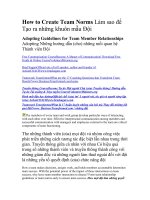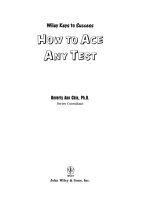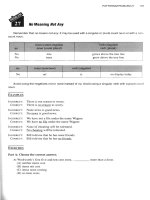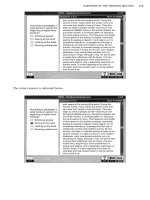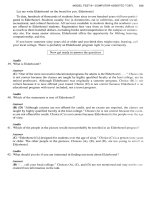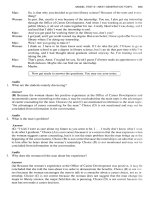Tài liệu HOW TO ACE ANY TEST docx
Bạn đang xem bản rút gọn của tài liệu. Xem và tải ngay bản đầy đủ của tài liệu tại đây (2.82 MB, 122 trang )
Wiley Keys to Success
H
OW TO
A
CE
A
NY
T
EST
Beverly Ann Chin, Ph.D.
Series Consultant
John Wiley & Sons, Inc.
ffirs.qxd 6/29/04 12:31 PM Page iii (PANTONE 180 U plate)
ffirs.qxd 6/29/04 12:31 PM Page vi (PANTONE 180 U plate)
Wiley Keys to Success
H
OW TO
A
CE
A
NY
T
EST
ffirs.qxd 6/29/04 12:31 PM Page i (PANTONE 180 U plate)
Beverly Ann Chin is Professor of English, Director of the English
Teaching Program, former Director of the Montana Writing Project, and
a former President of the National Council of Teachers of English.
Dr. Chin is a nationally recognized leader in English language arts
standards, curriculum instruction, and assessment. Many schools and
states call upon her to help them develop programs in reading and writ-
ing across the curriculum. Dr. Chin has edited and written numerous
books and articles in the field of English language arts. She is the
author of On Your Own: Writing and On Your Own: Grammar.
ffirs.qxd 6/29/04 12:31 PM Page ii (PANTONE 180 U plate)
Wiley Keys to Success
H
OW TO
A
CE
A
NY
T
EST
Beverly Ann Chin, Ph.D.
Series Consultant
John Wiley & Sons, Inc.
ffirs.qxd 6/29/04 12:31 PM Page iii (PANTONE 180 U plate)
This book is printed on acid-free paper.
Copyright © 2004 by BOOK BUILDERS LLC. All rights reserved.
Developed, Designed and Produced by BOOK BUILDERS LLC
Published by John Wiley & Sons, Inc., Hoboken, New Jersey
Published simultaneously in Canada
No part of this publication may be reproduced, stored in a retrieval system, or transmitted
in any form or by any means, electronic, mechanical, photocopying, recording, scanning,
or otherwise, except as permitted under Section 107 or 108 of the 1976 United States
Copyright Act, without either the prior written permission of the Publisher, or authoriza-
tion through payment of the appropriate per-copy fee to the Copyright Clearance Center,
222 Rosewood Drive, Danvers, MA 01923, (978) 750-8400, fax (978) 646-8600, or on the
to the Permissions Department, John Wiley & Sons, Inc., 111 River Street, Hoboken, NJ
07030, (201) 748-6011, fax (201) 748-6008.
Limit of Liability/Disclaimer of Warranty: While the publisher and the author have used
their best efforts in preparing this book, they make no representations or warranties with
respect to the accuracy or completeness of the contents of this book and specifically dis-
claim any implied warranties of merchantability or fitness for a particular purpose. No
warranty may be created or extended by sales representatives or written sales materials.
You should consult with a professional where appropriate. Neither the publisher nor the
author shall be liable for any loss of profit or any other commercial damages, including
but not limited to special, incidental, consequential, or other damages.
For general information about our other products and services, please contact our
Customer Care Department within the United States at (800) 762-2974, outside the United
States at (317) 572-3993 or fax (317) 572-4002.
Wiley also publishes its books in a variety of electronic formats. Some content that
appears in print may not be available in electronic books. For more information about
Wiley products, visit our web site at www.wiley.com.
Library of Congress Cataloging-in-Publication Data:
How to ace any test. / Beverly Ann Chin, series consultant.
p. cm.
Includes index.
ISBN 0-471-43156-7 (pkb. : alk. paper)
1. Examinations—Study guides—Juvenile literature. 2. Educational tests and measure-
ments—Study guides—Juvenile literature. 3. Test-taking skills—Juvenile literature.
LB3051.H843 2004
373.126—dc22 2004002223
Printed in the United States of America
10987654321
ffirs.qxd 6/29/04 12:31 PM Page iv (PANTONE 180 U plate)
web at www.copyright.com. Requests to the Publisher for permission should be addressed
D
EAR
S
TUDENTS
Welcome to the WILEY KEYS TO SUCCESS series! The books in this
series are practical guides designed to help you be a better student.
Each book focuses on an important area of schoolwork, including
building your vocabulary, studying and doing homework, writing
research papers, taking tests, and more.
Each book contains seven chapters—the keys to helping you
improve your skills as a student. As you understand and use each key,
you’ll find that you will enjoy learning more than ever before. As a
result, you’ll feel more confident in your classes and be better prepared
to demonstrate your knowledge.
I invite you to use the WILEY KEYS TO SUCCESS series at
school and at home. As you apply each key, you will open the doors to
success in school as well as to many other areas of your life. Good
luck, and enjoy the journey!
Beverly Ann Chin, Series Consultant
Professor of English
University of Montana, Missoula
ffirs.qxd 6/29/04 12:31 PM Page v (PANTONE 180 U plate)
ffirs.qxd 6/29/04 12:31 PM Page vi (PANTONE 180 U plate)
N
OTE TO
T
EACHERS
,
L
IBRARIANS
,
AND
P
ARENTS
The WILEY KEYS TO SUCCESS series is a series of handbooks
designed to help students improve their academic performance.
Happily, the keys can open doors for everyone—at home, in school,
at work.
Each book is an invaluable resource that offers seven simple, prac-
tical steps to mastering an important aspect of schoolwork, such as
building vocabulary, studying and doing homework, taking tests, and
writing research papers. We hand readers seven keys—or chapters—
that show them how to increase their success as learners—a plan
intended to build lifelong learning skills. Reader-friendly graphics, self-
assessment questions, and comprehensive appendices provide addi-
tional information.
Helpful features scattered throughout the books include “Writing it
Right,” which expands on the text with charts, graphs, and models;
“Inside Secret,” which reveals all-important hints, rules, definitions, and
even warnings; and “Ready, Set, Review,” which makes it easy for stu-
dents to remember key points.
WILEY KEYS TO SUCCESS are designed to ensure that all stu-
dents have the opportunity to experience success. Once students know
achievement, they are more likely to become independent learners,
effective communicators, and critical thinkers. Many readers will want
to use each guidebook by beginning with the first key and progressing
systematically to the last key. Some readers will select the keys they
need most and integrate what they learn with their own routines.
ffirs.qxd 6/29/04 12:31 PM Page vii (PANTONE 180 U plate)
As educators and parents, you can encourage students to use the
books in this series to assess their own strengths and weaknesses as
learners. Using students’ responses and your own observations of their
study skills and habits, you can help students develop positive atti-
tudes, set realistic goals, form successful schedules, organize materials,
and monitor their own academic progress. In addition, you can discuss
how adults use similar study strategies and communication skills in
their personal and professional lives.
We hope you and your students will enjoy the WILEY KEYS TO
SUCCESS series. We think readers will turn to these resources time
and time again. By showing students how to achieve everyday success,
we help children grow into responsible, independent young adults who
value their education—and into adults who value learning throughout
their lives.
Beverly Ann Chin, Series Consultant
Professor of English
University of Montana, Missoula
Note to Teachers, Librarians, and Parents
viii
ffirs.qxd 6/29/04 12:31 PM Page viii (PANTONE 180 U plate)
C
ONTENTS
Introduction 1
1: Be Prepared 3
2: Practice, Practice, Practice 15
3: Tailor Your Studying Style 27
4: Construct Winning Essays 41
5: Master Your Test-Taking Strategies 57
6: Take Control of Test Anxiety 71
7: Improve with Experience 83
Appendix A: Standardized Tests: A Sample of What You’re
Expected to Know 99
Appendix B: Scheduling Your Time for Prime Studying 105
Appendix C: Top Ten Tips for Remembering What You
Studied 108
Index 109
foc.qxd 6/29/04 12:34 PM Page ix (PANTONE 180 U plate)
foc.qxd 6/29/04 12:34 PM Page x (PANTONE 180 U plate)
I
NTRODUCTION
Tests—Do We Need Them?
A test is coming into your life. It may be next month, or it may be next
Tuesday. It might even be tomorrow! How will you do?
You might feel completely prepared, and ready to take on the tough-
est questions. Or you may worry that you’ll get so nervous, you can’t
come up with any answers. Suppose you stayed up all night trying to
cram? You might be so tired, you’d fall asleep right on the test paper.
What if you find questions about things you’ve never heard of? Or
worse, suppose you almost know the answers. If only you’d studied a
little harder, or took better notes in class. What if your head explodes
from trying to fill it with too many facts?
Maybe that’s going a little too far. The truth is that although very
few people seem to enjoy taking tests, they can actually do better on
them if they try to make them a little bit fun. When you think of taking
a test, try to picture yourself as a guest on a game show. Or try to com-
pete with yourself to do better on each new test than you did on the
last one. Taking a test involves more than just answering specific ques-
tions to give you a certain number of points to pass a course.
cintro.qxd 6/29/04 12:35 PM Page 1 (PANTONE 180 U plate)
Tests are not punishment. They give you and your teacher feedback
on how much you are learning. They let you know whether you’ve mis-
understood an important concept or whether you should work harder
in a certain subject. They also can show where you’re doing especially
well.
Taking tests is a skill in its own right—and one that you’ll use
throughout your life. As you move on in school, tests may help you
decide whether to take an advanced class. If your heart is set on going
to a special high school, you’ll want to do your best on the type of test
that will help you get admitted. Of course, tests also are a big part of
getting into college. In college, doing well on tests in certain subjects
can even help you skip those courses!
When it comes to getting certain types of jobs, taking a test is part
of that too. Do you want to become a police officer or fire fighter, a
real estate agent or an accountant? At some point—you guessed it!—
you’ll need to pass a test. Lots of other jobs depend on tests, too.
Aside from those types of tests, think about the kinds of tests you
take to help you in other parts of life, such as a driver’s test, a first-aid
test, and a swimming test. Tests are definitely a part of life, so learning
to do your best when taking them can make life a little easier.
And just think how easy it can be if you learn to enjoy taking tests!
What you need is a plan—something better than hoping you get the
flu on test day. This book can help you make that plan. Its tips and
hints will help you remember what you’ve learned in class. You’ll dis-
cover strategies on how to take a test efficiently. If you follow the
seven keys to success, you’re sure to ace any test that comes your way.
Introduction
2
cintro.qxd 6/29/04 12:35 PM Page 2 (PANTONE 180 U plate)
W
hen a football player scores a touchdown or a dancer hits
all the right moves in a routine, they have prepared them-
selves by understanding the keys to success. Before you
can do well on a test, you have to form good habits, ask the right ques-
tions, and find out what you need to know. After learning what kind of
KEY 1
B
E
P
REPARED
✔ Forming Good Habits
✔ Asking Questions
✔ Finding Out What You Need to Know
✔ Studying for Different Kinds of Tests
When it comes to taking a
test, it doesn’t matter how
many pages you read or how
many hours you spend star-
ing at your notes—if you
don’t know how to prepare
yourself for success.
c01.qxd 6/29/04 12:37 PM Page 3 (PANTONE 180 U plate)
test you’ll be taking, you will be prepared to practice the skills needed
for your own winning score.
Forming Good Habits
Being a good student doesn’t take magic. You’ll find studying gets
easier when you have a positive attitude, stay organized, and feel
ready and willing to work. What can you do to make sure you’re on the
right path to forming good habits? Make sure to pay attention in class,
take good notes, ask questions, do your homework, and review regu-
larly. (For more detailed tips on effective study habits, read the Wiley
Keys to Success Series book, How to Study for Success.)
Pay attention and take notes in class
Paying attention in class seems like an obvious habit of good students.
When you pay attention, you also should be thinking about what is im-
portant to remember and write down. Your teacher can say a lot during
a class, but you don’t want to take down every word your teacher says.
A good note-taker is like a detective. Watch your teacher for clues
about what topics are important. Does your teacher write on the
board? That’s probably a major topic. Is some information mentioned
several times? Start writing in your notebook. Does the teacher hand
out a sheet about the topic while discussing it? Does the topic appear
on the overhead projector? Better get it down!
Now you have important information to put in your notebook. How
do you write it down? Do you just scribble everything together? That
makes important points hard to find at review time. Organizing your
notes can help you study later. When something goes up on the board,
use that for a heading. When your teacher makes a point, give that fact its
own special line. Leave plenty of space between these points—then you
can add your own notes and comments. Underline important phrases.
How to Ace Any Test
4
c01.qxd 6/29/04 12:37 PM Page 4 (PANTONE 180 U plate)
Some students think of their class notes as a first draft. After class
they recopy what they scribbled down. This does more than make their
notes neat and simpler to study. Rewriting in your own words can help
you remember facts better. If you take clear notes and make mental
connections as you listen, you’ll have an easier time when it comes to
reviewing for tests.
Do your homework
When you do your homework consistently, you also are preparing for
tests. You’re reading up on and answering questions about what you
learned in class. Often, homework shows the kinds of questions that
might turn up on tests. Also, when homework is graded, you get a
chance to find out what kind of answers your teacher prefers.
Good homework doesn’t get done quickly. Good students learn time
management, how to put their time to the best use. Suppose you end
up with free time at school. Why not use it to tackle homework? For
example, you could complete a reading assignment if the weather
keeps you in for recess.
If you have after-school activities, hitting the books before you go to
practice helps you make sure the schoolwork gets done. By using those
often wasted minutes between school and late afternoon activities for
homework, you may be surprised to find how much more time you’ve
made for doing other, fun things in the evening.
Once you’re aware of when to do your homework, it helps to know
where to do it. It’s important to avoid distractions when doing home-
work and studying for tests. Some people may say that music or TV “re-
laxes” them, but imagine they’re taking an important test. Would they
really want their favorite songs or TV programs on to take their minds
off their work? The answer, of course, is “No.” Everyone works better
without distractions.
Be Prepared
5
K
E
Y
1
c01.qxd 6/29/04 12:37 PM Page 5 (PANTONE 180 U plate)
If it’s a big job, break it into easy pieces
Sometimes, you may look at your homework list and not know where
to start. Does this look like a typical day of assignments from your
school?
How to Ace Any Test
6
Language Arts:
20 spelling words
10 vocabulary words to define
and use in a sentence.
Read the next three chapters
in the class novel
Math:
3 examples and 10 word problems
Science:
A sheet with an experiment to
do and then write about
Social Studies:
A reading assignment with
5 questions to answer
A research paper about
a neighboring state
First, tackle the things that are due tomorrow while you’re fresh
and sharp. Next, work on a certain amount of a future assignment—for
instance, the first five words in both the spelling and vocabulary lists. If
you need to set something up for the science experiment, do that.
Maybe you should let your parents know that you need some special
materials. Then, you might want to look through a book or explore the
state’s website on the Internet to find preliminary information for your
c01.qxd 6/29/04 12:37 PM Page 6 (PANTONE 180 U plate)
research paper. Finally, you might read a chapter in the novel. With any
luck, you’ll still have time for your favorite TV show.
Making a schedule that allows you to do a little at a time helps
shrink big jobs down into smaller ones. Some jobs, like memorizing,
actually happen easily if you work in small bits. Five ten-minute memo-
rizing sessions spread over a week help you remember more informa-
tion than you would if you crammed lots of facts into one hour of study
time in one evening. If you keep putting off the work, you may find
yourself facing too much to do all at once. One night isn’t enough to
write a research paper, do a science experiment, finish regular home-
work, and study for a spelling test. Something is going to suffer, and so
will you. However, if you do a part of each project every day—who
knows? You might even finish your research paper or science experi-
ment before it’s due.
Asking Questions
Have you heard this old saying: “How will I know if I don’t ask?”
That’s twice as important when you’re in school. If you don’t
understand something, ask about it. You’re not the only one who’ll
learn. Other students benefit, too. No matter how much your class-
mates might groan, lots of kids may feel just as lost as you do. Plus,
your teacher may see that this topic needs more work. Everyone can
feel better about discovering a problem in a class discussion rather
than on a test.
Don’t be shy. Speak up, and try to make sure your questions are
clear. Just saying, “I don’t get this!” doesn’t help anyone. Instead, you
might ask, “I don’t understand why we use the words, ‘Everybody
knows.’ Isn’t ‘everybody’ a lot of people? Shouldn’t it take a plural
verb?” Now you’re asking about something specific.
Be Prepared
7
K
E
Y
1
c01.qxd 6/29/04 12:37 PM Page 7 (PANTONE 180 U plate)
Keep in mind that while teachers want to answer your questions,
they also want to cover a certain amount of material in each class ses-
sion. If you have a lot of questions, you may want to save them for
after class. Also, if you feel embarrassed about asking for help, you
might find it easier to talk to your teacher privately. No teacher wants
to see a student fail. Talking helps both of you do your jobs better—
How to Ace Any Test
8
c01.qxd 6/29/04 12:37 PM Page 8 (PANTONE 180 U plate)
Be Prepared
9
K
E
Y
1
Questions to Ask
Remember that a good ques-
tion gives the teacher a launching
pad to discuss problems. Here
are some ways to ask questions
that teachers will appreciate:
“I’m not sure I understand this writing assignment. Could
you explain exactly what you need?”
“Could you give us a hint on Problem 19?”
Or, even better, “Could you show us how to set up Problem
31?”
“I’m having a hard time with this part of the chapter.
What does the author mean when she says, ‘Love doesn’t sit
like a stone, it always has to be made new, like bread’?”
Bring up a math problem you didn’t get right. “This is how I
tried to work it out. Could you show me where I went wrong?”
If you have a Social Studies report that isn’t going well,
ask “How can I expand my ideas? Can you show me what I’m
missing?”
c01.qxd 6/29/04 12:37 PM Page 9 (PANTONE 180 U plate)
learning and teaching. Even if you’re not doing well in a class, asking
questions shows that you’re trying.
If you don’t have time to talk after class, write your question down
and put it on the teacher’s desk. The teacher may give you an answer
later or give the whole class a review on the topic. Most importantly,
when a teacher gives you help, write the information down. When the
time comes to review the trouble spot, you’ll have the explanation that
clears it up right there in front of you.
Review every day
People are always on the run these days. Homework, activities, life in
general can make you feel that you have no time at all. Why should you
take time to sit down with your notebook and reread what you already
wrote down? For one thing, you get a chance to fill in any words or
ideas you might have missed while your teacher’s words are still fresh
in your mind. (Now you can see why it’s a good idea to leave lots of
space as you write notes in class.)
Daily reviews also help you remember the day’s work. Experiments
have shown that people begin to forget information within 24 hours.
The more material you hold onto, the easier time you’ll have studying
for tests. Rereading your notes helps the information stay in your mind.
In fact, the more often you see this information, the more likely you are
to remember it.
Be critical as you read your notes. Do you understand what’s writ-
ten there? If not, check your textbook. Still confused? Write some ques-
tions for the next class. Even when your notes make sense, you can
still add comments from what you read in your textbook. That way,
your notes are clearer when you go back to study them next time.
How to Ace Any Test
10
c01.qxd 6/29/04 12:37 PM Page 10 (PANTONE 180 U plate)
Finding Out What You Need to Know
As test time comes closer, you must concentrate on learning what
you need to learn. Many students do this by continually asking,
“Will this be on the test?” Teachers hear this question over and over
again, year after year, and have learned how to avoid simply giving you
the answer on a silver platter. You do have other ways to get the infor-
mation, however. Here are some helpful hints on how to get some help-
ful hints.
What will the test cover?
While teachers don’t hand out the questions and answers for an upcom-
ing test, they do give clues. You already know to pay attention in class. In
the days before the test, listen especially carefully to what your teacher
has to say. What points does he or she stress or repeat in class? Are any
of them different from topics in your textbook? You may want to ask
your teacher whether this is important information that was overlooked
in the text, or whether it is not as crucial as information that’s taught in
the book. This is another way of asking, “Will this be on the test?”
Many teachers set aside class time for a pre-test review. Keep your
eyes and ears open during these run-throughs. They’re a gold mine of
test information! Sometimes a teacher may schedule a special study
session during lunch or after school. Join the group and pay special at-
tention to anything you don’t already know. Some teachers hand out
study guides or worksheets with review material. Read them carefully.
Are you comfortable with all the topics? If you spot unfamiliar informa-
tion, ask about it so you can avoid any surprises during test time.
If the teacher doesn’t review before the test, then go over your class
notes carefully. Make a list of every topic you consider important. Skim
through the textbook chapters and do the same thing. Pay special
Be Prepared
11
K
E
Y
1
c01.qxd 6/29/04 12:37 PM Page 11 (PANTONE 180 U plate)
attention to headings within the chapters. Compare these two lists and
combine them. Before the test, find a chance to show this super-list to
the teacher. Ask if these topics cover what’s important for the test.
Listen carefully. If the teacher suggests additional topics, write them
down! If they seem totally unfamiliar, ask where you can get more in-
formation. You still have time to study them.
Studying for Different Kinds of Tests
Almost as important as knowing the answers is understanding the
questions. What types of questions will be on the test? Will you find
matching columns, fill-in-the-blanks, multiple-choice questions? Will
you have to write essays?
Your study plans may change depending on the kinds of questions
you’ll face. Short-answer questions demand that you know lots of facts.
You must fill your memory with names and dates, parts of speech, or
math formulas. Writing essays demands a broad grasp of a subject. You
must know how different topics, events, or ideas come together.
Often, tests mix both kinds of questions. So you’ll have to fine-tune
your studying style. If you memorize only facts, dates, and names, will
you know how to tie them together to answer an essay question? If you
concentrate on “the big picture” to cover the essay, will you know all
the supporting details needed to answer the shorter questions?
There are no correct answers to these questions—you have to find
the balance that’s right for you. If you have a hard time memorizing, at
least 6o percent of your time (and maybe more) should go into study-
ing the short answers. If essays are a challenge for you, spend more
time preparing for them.
What if it’s a standardized test?
More and more states have begun tracking how students and schools
are doing with standardized tests. These exams test what students have
12
How to Ace Any Test
c01.qxd 6/29/04 12:37 PM Page 12 (PANTONE 180 U plate)
learned in their past several years in school. For instance, tests might
be given in the fourth and then the eighth grades. The scores can affect
the jobs of teachers and principals, the amount of money that goes to
running a school, and the requirements a student may need to meet in
order to graduate with the rest of his or her class.
Mostly, these tests feature multiple-choice questions, which are an-
swered by filling in a special test form, often called bubble forms be-
cause you mark your answers in small circles that cover the page.
Getting familiar with the style of the questions and practicing the cor-
rect way to answer them is an important part of what you need to
study when preparing for these tests. You can find sample questions for
standardized tests in Appendix A at the end of this book.
How long will it be?
The longer the advance notice you receive about a test, the bigger it is
likely to be. A pop quiz may only have five questions and take fifteen
minutes. A final exam may go on for several hours. The quiz might
cover only last night’s reading, while the final reviews your whole
year’s work. Knowing when a test is coming allows you to plan your
preparation well ahead of time. Here’s a quick rule to remember: the
longer the test, the more time you’ll need to study for it.
When the test actually comes, you’ll also have to consider how
much time you have in which to finish the test. Whether you have fif-
teen minutes or two hours, remember to pace yourself. Often, doing
well means matching the right test-taking strategy to the amount of
time available. You’ll learn more about test-taking strategies later in
this book. For now, start by focusing on what it takes to become the
best student you can be.
Be Prepared
13
K
E
Y
1
c01.qxd 6/29/04 12:37 PM Page 13 (PANTONE 180 U plate)
